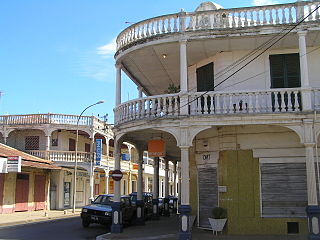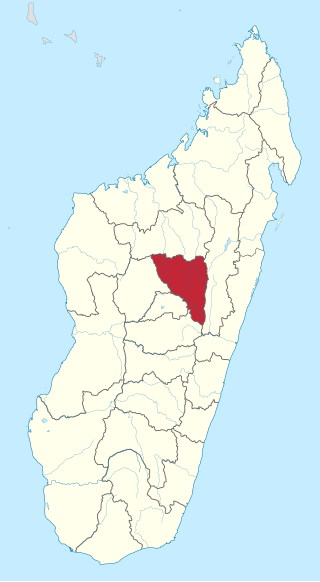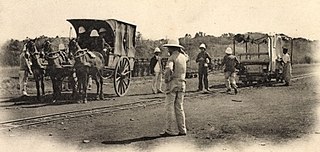It has been suggested that this article be merged into Rail transport in Madagascar . (Discuss) Proposed since November 2024. |
- This article is part of the history of rail transport by country series
It has been suggested that this article be merged into Rail transport in Madagascar . (Discuss) Proposed since November 2024. |

The history of rail transport in Madagascar began at the end on the nineteenth century, with the construction of industrial and military Decauville lines in the north of the country, centred on the port of Diego-Suarez (now Antsiranana). [1] [2] [3]
These were closely followed by the construction a metre gauge line between Brickaville (now Ampasimanolotra) and Madagascar's capital, Tananarive (now Antananarivo) in 1909. This line was extended to Toamasina, the country's chief seaport in 1913. The line is known as the Tananarive–Côte Est railway (TCE). It subsequently became the nucleus of a network of three railways, the Network North (French : Réseau Nord).
Between 1926 and 1936, an isolated line, the Fianarantsoa-Côte Est railway (FCE), was built, again in metre gauge, in the south east of the island. The FCE is known as Southern Network (French: Réseau Sud).
The two separate networks were combined under the same management in 1944.
On 1 January 1951 Régie des chemins de fer de Madagascar (RCFM) came into operation.
The whole system was nationalized in 1974.
It became a state corporation on 6 May 1982 as Réseau National des Chemins de Fer Malagasy (RNCFM).
By the 1990s, the national system was very run down and the Malagasy government decided to privatize it. In 2003 Network North was concessioned to a joint stock company, Madarail, under a 25-year concession, while the Southern network remained under parastatal operation. In 2022 the private investors desisted and the company is now 100% owned by the state of Madagascar. [4]

All of the above are of 1,000mm gauge.
Service on the line from Antananarivo to Antsirabe ceased the mid-1990's after the passage of the Cyclone Ana damaged a bridge over the river Sasaony. [5] The line between Antananarivo and Antsirabe re-opened on 2 December 2023. [6]
There had been also a project to connect the port of Mahajanga with the port of Toamasina, via Lac Alaotra. This was never realized.

All of the above were of 1,000mm gauge.
In addition there were a number of industrial and military lines including:
Paved and unpaved roadways, as well as railways, provide the main forms of transport in Madagascar. Madagascar has approximately 31,640 km (19,660 mi) of paved roads and 836 km of rail lines. In 2010, Madagascar had 432 km (270 mi) of navigable waterways.

Antsiranana, named Diego-Suarez prior to 1975, is a city in the far north of Madagascar. Antsiranana is the capital of Diana Region. It had an estimated population of 115,015 in 2013.

The Toamasina Province is a former province of Madagascar with an area of 71,911 km2. It had a population of 2,855,600 (2004). Its capital was Toamasina, the most important seaport of the country. The province was also known as Tamatave Province.

Antsirabe is the third largest city in Madagascar and the capital of the Vakinankaratra region, with a population of 265,018 in 2014. In Madagascar, Antsirabe is known for its relatively cool climate, its industry and the high concentration of pulled rickshaws or pousse-pousse. It attracts around 30,000 tourists a year.

The Catholic Church in Madagascar is part of the worldwide Catholic Church, under the spiritual leadership of the Pope in Rome.

Brickaville is a town and commune in Atsinanana Region, Madagascar.
The government of Madagascar has granted Madarail a 25-year concession to operate the northern of the two national rail lines. The company is investing in Madagascar's rail system. Operations began in 2003 with one locomotive; 7 more locomotives have been purchased from the Portuguese Comboios de Portugal, the CP Class 9020.

Rail transport in Madagascar is primarily operated by Madarail. There are two unconnected systems having a total length of 855 km (531 mi), as of 2023, all metre gauge, 1,000 mm. The northern railway is concessioned to Madarail. Since April 2022 Madarail has been 100% owned by the Madagascan state. The southern line, Fianarantsoa-Côte-Est railway is a parastatal line.

Analamanga is a region in central Madagascar, containing the capital Antananarivo and its surrounding metropolitan area. The region has an area of 17,488 square kilometres, and had a population of 4,325,226 in 2018.
The Société Nationale des Chemins de Fer Tunisiens, abbreviated SNCFT, is the national railway of Tunisia and under the direction of the Ministry of Transport. SNCFT was founded on December 27, 1956 It Replaced the Tunisian Railway Farms Company (CFT). Headquartered in Tunis the company employs about 6000 people. SNCFT provides both passenger and freight services at a national level.

Alaotra-Mangoro is a region in eastern Madagascar. It borders Sofia Region in north, Analanjirofo in northeast, Atsinanana in east, Vakinankaratra in southwest, Analamanga in west and Betsiboka in northwest. The capital of the region is Ambatondrazaka, and the population was 1,255,514 in 2018. The area of the region is 31,948 km2 (12,335 sq mi).
List of Railway stations in Madagascar include:

Moramanga District is a district in the Alaotra-Mangoro region in Madagascar. Its capital is Moramanga.

Antsirabe I is a district in, and capital of, Vakinankaratra Region, Madagascar. The borders of the district are identical to those of the city and urban commune of Antsirabe.

The Diego Suarez Decauville railway was a 24 km (15 mi) long 600 mm gauge military railway from Antsirane to Sakaramy in Madagascar.

University of Antananarivo is the primary public university of Madagascar, located in the capital Antananarivo.

Sakaramy is a rural municipality in Madagascar, 22 km from Antsiranana. It belongs to the district of Antsiranana II, which is a part of Diana Region. The population of the municipality was estimated to be approximately 3400 in 2012.
![]() Media related to Rail transport in Madagascar at Wikimedia Commons
Media related to Rail transport in Madagascar at Wikimedia Commons